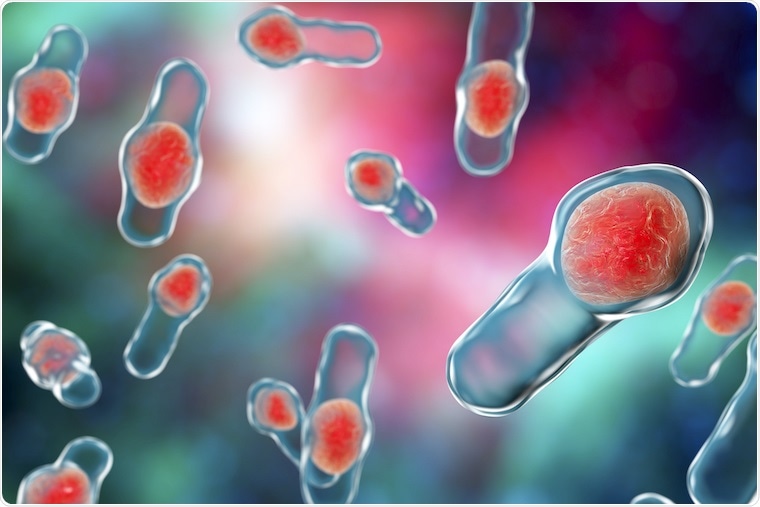New research from the University of Virginia School of Medicine sheds light on why a fecal transplant can benefit patients with dangerous recurrent C. difficile infections – and suggests a way to improve patient outcomes.

C. difficile, depicted here, is a bacterium that naturally lives in our colon. But long-term antibiotic use can disrupt its natural state and cause it to turn potentially deadly. New fecal transplant research suggests a way to help patients with recurrent C. diff infections. Image Credit: UVA Health
C. difficile infection causes life-threatening diarrhea, and it often takes hold in patients in hospitals and nursing homes as a result of long-term antibiotic use. Doctors have known that fecal transplants – literally transplanting fecal material from a healthy person into the sick – can improve C. difficile outcomes, but they haven't fully understood why. The new UVA research offers important answers.
Even though we know that fecal microbiota transplants can treat recurrent C. difficile infection, we don't know exactly why some microbe combinations work better than others or why the same combinations can have different effects on different people. We believe that this variability stems from each person's immune system being unique. That is why it is important for us to find out what immune markers change in patients where fecal microbiota transplantation was successful in preventing C. difficile re-infections. Finding that a specific immune signaling molecule, IL-25, was increased in successful fecal microbiota transplantations indicated that maybe IL-25 can be used as an adjunctive therapy for treating C. difficile infection."
Ning-Jiun "Ninj" Jan, PhD, Researcher, UVA's Division of Infectious Disease and International Health
Fecal transplant benefits
The new findings come from the lab of UVA's Chelsea Marie, PhD, where Jan is a research scientist. To better understand the effects of fecal transplants on patients with C. difficile, Marie, Jan and their collaborators looked at blood and colon-tissue samples collected from patients at the time of their transplants and then again 60 days later.
The researchers found that the transplants increased the presence of IL-25, an important agent of the immune system, in the patients' colons. The cytokine serves as a vital link in the communication chain that controls our body's immune responses. This increase in IL-25 was accompanied by a decrease in damaging tissue inflammation.
The transplants also increased the diversity of the microbes that naturally live in our colons, the researchers found. These microorganisms have increasingly been appreciated as essential for good health.
The researchers conclude that the changes triggered by fecal transplants, including beneficial changes in the activity of certain genes, bolster the ability of the immune system to battle recurrent C. difficile infections. This ultimately helps patients heal.
The scientists believe that doctors may be able to enhance the benefits of fecal transplants by using other means to promote IL-25 in patients battling recurrent C. difficile.
"In the future it may be possible to combine fecal microbiota transplants with cytokine-based therapies to increase the success rate of treatment," Jan said. "There is a lot of interplay between our immune system and our intestinal microbes, and it's exciting that understanding their relationship is helping us find new therapies."
Findings published
The researchers have published their findings in the scientific journal mSphere. The article is open access, meaning it is available to read for free online. The research team consisted of Jan, Ann Hays, Noah Oakland, Pankaj Kumar, Girija Ramakrishnan, Brian W. Behm, William A. Petri Jr. and Marie. Petri is a consultant for TechLab Inc., and Marie is a medical author for Merck Manuals.
The research was supported by the National Institutes of Health's National Institute of Allergy and Infectious Diseases, grants R01AI148518, R01AI124214 and R01AI152477.
Source:
Journal reference:
Jan, N., et al. (2021) Fecal Microbiota Transplantation Increases Colonic IL-25 and Dampens Tissue Inflammation in Patients with Recurrent Clostridioides difficile. mSphere. doi.org/10.1128/mSphere.00669-21.